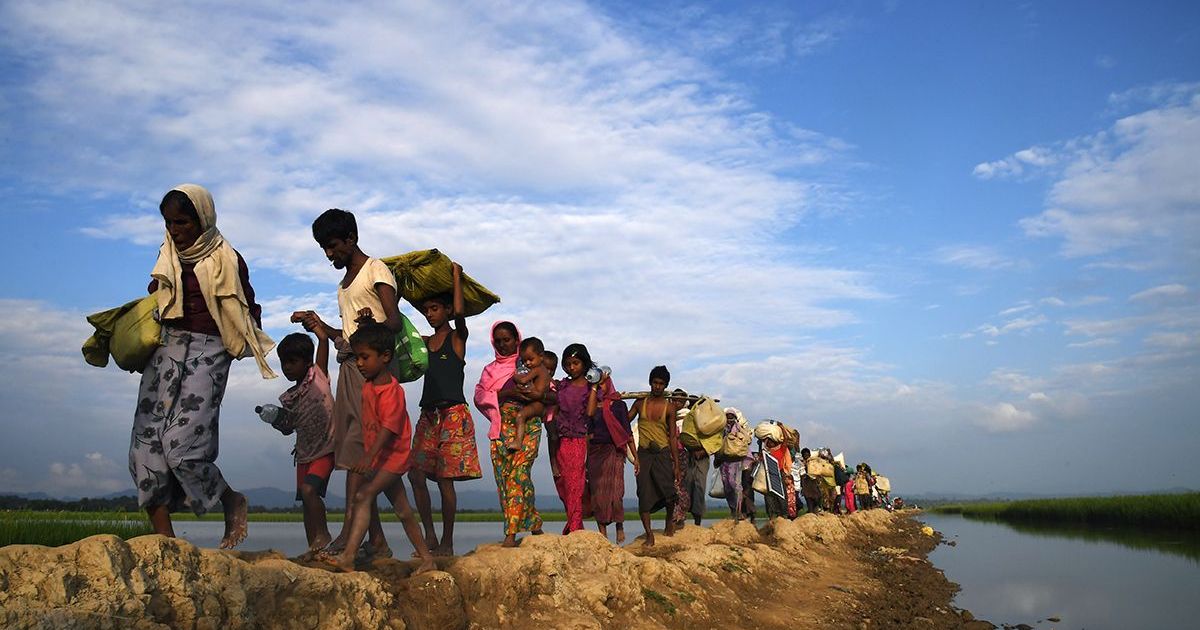
Friday, August 25th, commemorates the sixth anniversary of the commencement of a massive offensive launched by Myanmar’s military against the predominantly Muslim minority residing in Rakhine state.
During this devastating event, around 10,000 Rohingya individuals, encompassing men, women, children, and even newborns, lost their lives. Over 300 villages were razed to the ground, and a staggering 700,000 people were compelled to flee to Bangladesh in pursuit of safety. They joined the ranks of tens of thousands who had previously fled earlier waves of persecution.
“Responsibility for the immense suffering of the Rohingya starts at the top. Min Aung Hlaing, who led the genocidal campaign, is now at the head of an illegal and illegitimate military junta that is attacking civilian populations throughout Myanmar. He must be brought to justice and be made to answer for his crimes,” Tom Andrews, the Special Rapporteur on the situation in Myanmar, said in his appeal to the world leaders to end the “deadly paralysis of indifference.”
Abdus Shukkur, aged 37, is navigating between offices in Germany, nurturing hope for the approval of his asylum application in the next few months. He belonged to the approximately 1.2 million Rohingya Muslims compelled to escape Myanmar in 2017, when the nation’s military initiated a harsh crackdown targeting this ethnic group in the Rakhine state, reports Turkey-based AA news portal.
“I am among those hundreds of thousands of Rohingya individuals who were coerced out during the 2017 exodus imposed upon us by the Burmese military,” Shukkur, originally known as Aung Naing Shwe, said.
As a researcher, the years away from home led him to Bangladesh and subsequently to Turkey, where he instructed Rohingya students online in international relations and political science, before eventually settling in Munich.
The UN has labelled the Rohingya as the most oppressed people globally, subject to what human rights organizations term a genocide.
According to Amnesty International, over 750,000 Rohingya refugees, mainly women and children, fled Myanmar and crossed into Bangladesh following a crackdown by Myanmar’s forces on the minority Muslim community in August 2017, elevating the count of persecuted individuals in Bangladesh to over 1.2 million.
Since August 25, 2017, a report by the Ontario International Development Agency (OIDA) has documented that nearly 24,000 Rohingya Muslims were killed by Myanmar’s state forces.
The OIDA report titled “Forced Migration of Rohingya: The Untold Experience” also revealed that more than 34,000 Rohingya were cast into fires, while another 114,000 were subjected to physical assaults.
Myanmar’s army and police raped as many as 18,000 Rohingya women and girls, while over 115,000 Rohingya homes were set ablaze, and 113,000 others were vandalized, the report added.
Shukkur holds a positive outlook regarding his asylum application in Germany. “Once my (asylum) case is approved here in Germany, I will gain all the rights of any German citizen… including education, political rights, and every opportunity,” he affirmed.
Reflecting on his situation in Rakhine, he lamented, “I possess no rights there. I am unable to lead a normal life in my own homeland.”
He is currently pursuing a doctoral degree in the realm of political science and public administration.
“I have the chance to establish my family in Germany, where my children can pursue their dreams,” he expressed, skeptical about the prospects of a normal life for repatriated Rohingya in Myanmar. “Myanmar will not embrace us. We were expelled from our homeland due to the high value of our native state, Rakhine, owing to its natural resources,” he explained.
“China also seeks to invest there, and Myanmar is disinclined to take us back.” Those Rohingya who do return to Myanmar are confined to camps upon their arrival. “That does not constitute a normal life,” Shukkur emphasized.
While numerous countries have showcased their solidarity with the oppressed community, Nay San Lwin, co-founder of the advocacy group Free Rohingya Coalition, emphasized the necessity for “concrete measures” at this juncture.
“Many countries express solidarity, yet when it comes to tangible measures, few step forward,” Lwin informed Anadolu. The Rohingya aspire to a “dignified repatriation with full rights,” he affirmed.
“China negotiated a repatriation deal for the Rohingya, yet this was unacceptable as Myanmar authorities dispatched us to detention centres. This is even worse than camps,” Lwin remarked, echoing Shukkur’s concerns.
“A dignified return entails enjoying complete rights and returning to our native villages,” he concluded. (IPA Service)
The post Six Years On, Oppressed Rohingyas Want A ‘Respectable Comeback’ To Myanmar first appeared on Latest India news, analysis and reports on IPA Newspack.


